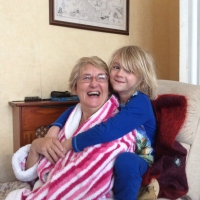
Line of Duty's ableist treatment of Terry?

Cher_Alumni
Scope alumni Posts: 5,714 Championing
In a recent Metro article, Rachel Charlton-Dailey wrote about what she perceived as the ableist treatment of key character - Terry Boyle.

Terry, played by disabled actor Tommy Jessop, has Down's syndrome and is at the centre of a storyline that see's him being framed for the murder of high-profile journalist Gail Vella by an organised crime gang (OCG!). Featured in many scenes being interviewed by the police, Terry is consistently on the receiving end of negative comments not equally dealt out to his non-disabled counterparts. Rachel explains:
Consistently, Terry has been infantilised: from officers doubting he could be capable of understanding what’s going on to Ted Hastings (Adrian Dunbar) calling him variations of ‘wee fella’ and ‘poor lad’. But at least that’s not as insulting as when he referred to Terry as ‘the local oddball’.
How is this ableism?
Understanding ableism as the worldview that pits disabled people below and as inferior to non-disabled people, it could be argued that the Line of Duty programme makers have failed to use this as an opportunity to stop ableist narratives; whilst, in turn reinforcing prejudicial attitudes.Conversely, you could point out that the show's writer Jed Mercurio is merely replicating 'real life' language used in police stations which, however unfairly discriminatory, is more authentic than suggesting otherwise.
What are your thoughts?
It's a tough one and, as an ardent Line of Duty fan, Terry's treatment and the language used to describe him has bothered me. I'm heartened to see a disabled character (played by a disabled person) in such a prominent role but in a prime-time series attracting millions, my concern is that disabled people are once again being seen in a stigmatised light. What do you think?0
Comments
-
my concern is that disabled people are once again being seen in a stigmatised lightYou could try complaining about it @Cher_Scope?0
-
@leeCal I could and that's definitely something I'm going to think about more! Have you watched the series?
0 -
No, I haven’t watched the series at all. I prefer to watch a non violent film if I can these days.0
-
I tend to agree here in a way but looking from the other side it does highlight the vulnerability of the disabled. It wouldn't be as bad if the way he was treated especially during the interviews demonstrated that adjustments that could have been put in place
Show how the police would support a disabled person
Just my opinion of course0 -
I think you need to give Tommy Jessop credit for the incredible role he is portraying. Whilst I understand, it could be perceived as stigmatising, this is fiction. I will be the first to complain if I thought this was patronising, but within the concept of the storyline I believe Jed Mercurio has handled the issue with sensitivity. As @Janer1967 stated, it does highlight the vulnerability of the disabled.0
-
I think there is definitely a lack of awareness in terms of language but I definitely think that the vulnerability is super important to highlight. It also makes me wonder how people with disabilities may be treated by the police - in terms of this it may provide a wake-up call0
-
if the program was totally PC then it wouldn’t be true to live. The description used by Ted where not said offensively, if it where a about Terry and how the police and government bodies interacted with disabled people the program wouldn’t work and the viewers would not watch.1
-
I do agree with that, absolutely. The language side is definitely true that it needs to be realistic - in the sense that the use of language is a common barrier in communitieswilko said:if the program was totally PC then it wouldn’t be true to live. The description used by Ted where not said offensively, if it where a about Terry and how the police and government bodies interacted with disabled people the program wouldn’t work and the viewers would not watch.0
Categories
- All Categories
- 15.6K Start here and say hello!
- 7.3K Coffee lounge
- 101 Games den
- 1.7K People power
- 139 Announcements and information
- 24.5K Talk about life
- 5.9K Everyday life
- 451 Current affairs
- 2.4K Families and carers
- 882 Education and skills
- 1.9K Work
- 549 Money and bills
- 3.7K Housing and independent living
- 1.1K Transport and travel
- 625 Relationships
- 1.5K Mental health and wellbeing
- 2.5K Talk about your impairment
- 870 Rare, invisible, and undiagnosed conditions
- 932 Neurological impairments and pain
- 2.1K Cerebral Palsy Network
- 1.2K Autism and neurodiversity
- 40.5K Talk about your benefits
- 6.1K Employment and Support Allowance (ESA)
- 19.9K PIP, DLA, ADP and AA
- 8.8K Universal Credit (UC)
- 5.8K Benefits and income




